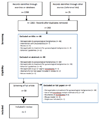Systematic Review: The Impact of Cancer Treatment on the Gut and Vaginal Microbiome in Women With a Gynecological Malignancy
- PMID: 28590950
- PMCID: PMC5571893
- DOI: 10.1097/IGC.0000000000000999
Systematic Review: The Impact of Cancer Treatment on the Gut and Vaginal Microbiome in Women With a Gynecological Malignancy
Abstract
Background and aim: Worldwide, 1,470,900 women are diagnosed yearly with a gynecological malignancy (21,000 in the UK). Some patients treated with pelvic radiotherapy develop chronic changes in their bowel function. This systematic review summarizes current research on the impact of cancer treatment on the gut and vaginal microbiome in women with a gynecological malignancy.
Methods: The Preferred reporting Items for Systematic Reviews and Meta-analyses guidelines for systematic reviews were used to ensure transparent and complete reporting. Quantitative studies exploring the gut or vaginal microbiome in this patient cohort were included. Animal studies were excluded. There were no language restrictions.
Results: No studies examined the possible effects of surgery or chemotherapy for gynecological cancers on the gut or vaginal microbiome.Three prospective cohort studies were identified using sequencing of changes in the gut microbiome reporting on a total of 23 women treated for gynecological cancer. All studies included patients treated with radiotherapy with a dosage ranging from 43.0 to 54.0 Gy. Two studies assessed gastrointestinal toxicity formally; 8 women (57%) developed grade 2 or 3 diarrhea during radiotherapy. The outcomes suggest a correlation between changes in the intestinal microbiome and receiving radiotherapy and showed a decrease in abundance and diversity of the intestinal bacterial species. Before radiotherapy, those who developed diarrhea had an increased abundance of Bacteroides, Dialister, and Veillonella (P < 0.01), and a decreased abundance of Clostridium XI and XVIII, Faecalibacterium, Oscillibacter, Parabacteroides, Prevotella, and unclassified bacteria (P < 0.05).
Conclusion: The limited evidence to date implies that larger studies including both the vaginal and gut microbiome in women treated for a gynecological malignancy are warranted to explore the impact of cancer treatments on the microbiome and its relation to developing long-term gastrointestinal toxicity. This may lead to new avenues to stratify those at risk and explore personalized treatment options and prevention of gastrointestinal consequences of cancer treatments.
References
-
- Cancer Research UK. Cancer statistics- new cases. 2015 Accessed via: http://www.cancerresearchuk.org/health-professional/cancer-statistics January 2017.
-
- Taylor A, Fernandes A, Kumar P, Muls A. Textbook of the European Gynae Oncology Society. 2016. Acute and chronic toxicity of pelvic radiotherapy. Chapter 138. 12pp.
-
- Ferreira M, Muls A, Dearnaley D, Andreyev HJN. Microbiome and radiation-induced bowel toxicity: lessons from inflammatory bowel disease for the radiation oncologist. Lancet Oncol. 2014;15(3):e139–47. - PubMed
Publication types
MeSH terms
Grants and funding
LinkOut - more resources
Full Text Sources
Other Literature Sources


